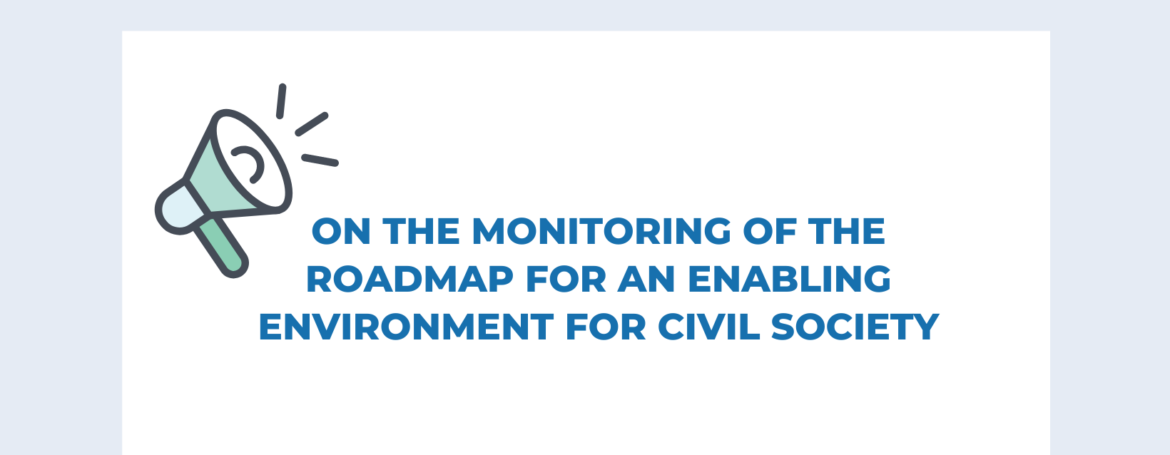 In News
In News
On the Monitoring of the Roadmap for an Enabling Environment for Civil Society
On June 22, 2022, was held the meeting of the National Council for Civil Society (NCCS).
Present at the meeting, in addition to the members of the NCCS and to the Agency for the Support of Civil Society (ASCS) which plays the role of the Secretariat of the NCCS, were also representatives of four organizations that had expressed interest in attending, among them representatives of the National Resource Centre for Civil Society, Partners Albania for Change and Development.
In accordance with the agenda of the meeting, as part of it, a presentation was held by the General Directorate of the Policy Unit, Prime Minister’s Office, on the monitoring of the roadmap for the government’s policy “On the creation of an enabling environment for civil society 2019-2023”, the strategic document that aims to strengthen the role of civil society in co-governance through the creation of an enabling environment for civil society in the country and in increasing of dialogue and cooperation between the sector and governing institutions.
While we appreciate the government’s willingness to monitor the implementation of the Roadmap and share the monitoring results, we must emphasize that there were several issues with this presentation:
First, the monitoring process was not carried out in cooperation, with the contribution, and the involvement of civil society organisations (CSOs) at the country level, as stipulated in the Decision of Council of Ministers (DCM) No. 539, dated 25.7.2019 “For the Approval of the Roadmap for Government Policy Towards an Enabling Environment for the Development of Civil Society 2019-2023, Revised”. During these years, there was no monitoring process happening with the involvement of civil society. Such a process has not happened and there have been no initiatives for the solicitation of civil society input with regard to this important document pertaining to it. Even the representatives of the civil society in the NCCS were not involved in this process.
Secondly, the presentation shows that the three strategic priorities have been achieved to the extent of over 50%, respectively:
– Strategic Direction 1 of the Roadmap “Institutionalized Government-Civil Society Cooperation in Policymaking and European Integration” has been implemented to the extent of 85%;
– Strategic direction 2 “Enabling the legal environment & data governance” has been realized to the extent of 64%; and
– Strategic direction 3 “Favourable fiscal and funding framework” has been implemented to the extent of 63%.
Meanwhile, in all recent years reports on the monitoring of the enabling environment for civil society in Albania (Monitoring Matrix on the Enabling Environment for Civil Society Development, Country Report for Albania 2020), in the European Union’s Progress Report for Albania, and other reports that focus on this issue, it has been emphasized that there is no or very little progress in terms of the implementation of the roadmap and the realization of the measures it envisages.
During the last three years, there has been a constant lack of public information on the progress of the implementation of the Roadmap by all responsible institutions. Since the start of the implementation of the Roadmap, this is the first meeting where is provided information on the monitoring of the Roadmap and the progress so far.
Thirdly, the presentation held by the General Directorate of the Policy Unit, Prime Minister’s Office focused on the % (percentages) of the implementation of the measures and not on concrete indicators that reflect progress, showing insufficient transparency with regard to this monitoring. There is no public information on how the assessment of this progress was made and what are the evidences for the implementation of measures and indicators. From the presentation, it is found that in some cases the measurement of the progress is based on achievements that are not related to the indicators of the relevant measure. Partners Albania for years now monitors the enabling environment for civil society in the country and prepares annual reports in this regard. Based on all the publicly available information and on the information declared by the institutions as part of our monitoring work, as well as the CSOs work practice, for a significant part of the measures and indicators, the presented result has not been achieved.
In this table are presented some of these measures, and the implementation percentage presented by government representatives, as well as comments from the monitoring of Partners Albania for these measures.
Acknowledging the importance of the implementation of the Road Map and of the periodic monitoring process in cooperation and with the contribution and involvement of CSOs at the country level, we invite the responsible institutions to be more transparent in sharing information on this process and the actors involved, as well as in sharing a full report regarding the implementation and progress of the measures, following the presentation at the NCCS meeting.


